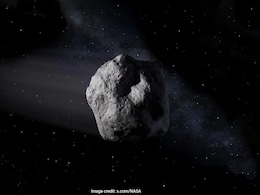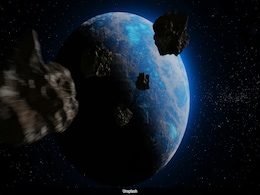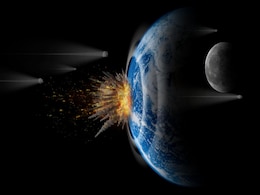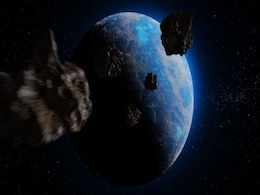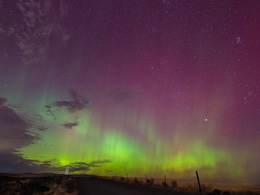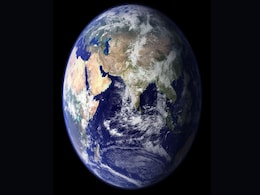Risk To Earth
- All
- News
- Videos
-

NASA Confirms Asteroid 2024 YR4 Will Not Hit Earth, Risk Reduced to Zero
- Friday February 28, 2025
- Written by Gadgets 360 Staff
NASA has reassured the public that asteroid 2024 YR4 no longer poses any threat to Earth. Initially, the asteroid had a 1-in-32 chance of impact, making it a Level 3 risk on the Torino Scale. However, new observations have reduced the probability to zero. The asteroid will make close flybys in 2028 and 2032, providing scientists with an opportunity...
-
 www.gadgets360.com
www.gadgets360.com
-

NASA Lowers Risk of Asteroid 2024 YR4 Impact
- Friday February 21, 2025
- Written by Gadgets 360 Staff
NASA has significantly lowered the risk of asteroid 2024 YR4 hitting Earth in 2032. Initial estimates placed the impact probability at 1 in 32, but updated calculations have reduced it to just 1 in 360 (0.28 percent). Experts believe the risk will continue to decline as more data is collected. Despite being the riskiest asteroid on NASA’s Sentry ...
-
 www.gadgets360.com
www.gadgets360.com
-

NASA Lowers Asteroid 2024 YR4's Impact Risk: What May Happen If It Hits Earth
- Thursday February 20, 2025
- World News | Edited by NDTV News Desk
The asteroid 2024 YR4, estimated to be 130 to 300 feet wide, was first discovered on December 27, 2024.
-
 www.ndtv.com
www.ndtv.com
-

'City-Killer' Asteroid's Risk Of Hitting Earth Drops To 1.5%. Why It Keeps Changing
- Thursday February 20, 2025
- India News | Edited by NDTV News Desk
The asteroid, expected to be between 130 and 330 feet wide, was detected in December last year.
-
 www.ndtv.com
www.ndtv.com
-

Telescope Captures "City-Killer" Asteroid, NASA Tracking Potential Threat
- Tuesday February 18, 2025
- Science | Edited by NDTV News Desk
A newly discovered asteroid has climbed to the top of NASA's impact risk list after fresh observations doubled its chances of striking Earth in 2032.
-
 www.ndtv.com
www.ndtv.com
-

Asteroid 2024 YR4 Has a 2.3 Percent Chance of Hitting Earth in 2032, Says NASA
- Tuesday February 18, 2025
- Written by Gadgets 360 Staff
Asteroid 2024 YR4, measuring 180 feet wide, has a 2.3% chance of impacting Earth on 22 December 2032, according to scientists. A smaller 0.3% risk of the asteroid colliding with the moon has also been noted. While the Earth impact could release energy equal to 8 megatons of TNT, a moon strike may create a visible crater. Researchers are using the J...
-
 www.gadgets360.com
www.gadgets360.com
-

James Webb Telescope to Study Potentially Hazardous Asteroid 2024 YR4
- Thursday February 13, 2025
- Written by Gadgets 360 Staff
Asteroid 2024 YR4, identified in December 2024, has a 2.3% chance of Earth impact in December 2032. Due to uncertainties in ground-based size estimates, JWST will conduct infrared observations in March and May to determine its true dimensions. The European Space Agency estimates its width at 55 metres, but it could be as large as 90 metres. The fin...
-
 www.gadgets360.com
www.gadgets360.com
-

May 2024 Solar Storm Triggers Unusual Radiation Belts, Raising Space Safety Concerns
- Wednesday February 12, 2025
- Written by Gadgets 360 Staff
A significant solar storm in May 2024 led to the creation of two temporary radiation belts, detected by the CIRBE satellite in June. One belt contained high-energy electrons, while the other was rich in protons, a rare occurrence. While the electron belt dissipated in three months, the proton-dominated belt remains, potentially affecting space miss...
-
 www.gadgets360.com
www.gadgets360.com
-

Asteroid 2024 YR4 Poses 1-in-43 Chance of Earth Impact in 2032
- Monday February 10, 2025
- Written by Gadgets 360 Staff
Asteroid 2024 YR4, identified by NASA, has a 1-in-43 chance of colliding with Earth on December 22, 2032. Measuring approximately 55 metres in diameter, it is not large enough to cause a global catastrophe but could result in significant destruction if it impacts a densely populated area. Scientists estimate the impact could release 8 megatons of e...
-
 www.gadgets360.com
www.gadgets360.com
-

Astronaut Vision Changes in Space, Pose Risks for Mars Exploration
- Friday February 7, 2025
- Written by Gadgets 360 Staff
Reports indicate that 70 percent of astronauts on extended ISS missions develop vision issues linked to spaceflight-associated neuro-ocular syndrome (SANS). The condition, caused by fluid shifts in microgravity, leads to optic nerve swelling, vision impairment, and structural eye changes. While symptoms often reverse upon return to Earth, the long-...
-
 www.gadgets360.com
www.gadgets360.com
-

Increasing Space Debris Risks Aircraft Collisions, Experts Warn
- Thursday February 6, 2025
- Written by Gadgets 360 Staff
Uncontrolled space debris entering Earth's atmosphere is becoming a growing concern, with rising risks to aircraft safety. A study from the University of British Columbia reveals a 26% chance of debris collisions in high-traffic regions like the Northeastern US and Northern Europe. Recent incidents, such as falling debris from SpaceX’s Starship 7...
-
 www.gadgets360.com
www.gadgets360.com
-

Rocket Lab Delays IoT Satellite Launch to Ensure Safe Trajectory in Space
- Thursday February 6, 2025
- Written by Gadgets 360 Staff
Rocket Lab has postponed its "IOT 4 You and Me" mission to avoid potential collisions with satellites and the International Space Station. This mission, set to deploy five IoT satellites, marks Rocket Lab's first launch of 2025. The company is taking extra precautions to monitor space traffic and ensure the rocket follows a safe trajectory. The sat...
-
 www.gadgets360.com
www.gadgets360.com
-

Asteroid 2024 YR4 Has a Small but Notable Chance of Earth Impact in 2032
- Friday January 31, 2025
- Written by Gadgets 360 Staff
NASA scientists are closely monitoring asteroid 2024 YR4, a newly discovered 55-metre-wide object with a 1.2% chance of impacting Earth on December 22, 2032. If it collides, it could release energy equivalent to eight megatons of TNT, enough to cause serious regional damage. Currently ranked as a Level 3 threat on the Torino Scale, its classificati...
-
 www.gadgets360.com
www.gadgets360.com
-

Chorus Waves Found Far From Earth Raise Concerns for Space Exploration
- Tuesday January 28, 2025
- Written by Gadgets 360 Staff
Chorus waves, energetic electromagnetic bursts resembling bird chirps, have been detected 100,000 miles from Earth, far beyond their usual range. NASA's Magnetospheric Multiscale satellites observed these waves in a flatter region of Earth's magnetosphere, contradicting prior assumptions about their formation near strong magnetic gradients. The wav...
-
 www.gadgets360.com
www.gadgets360.com
-

2024 Marks Earth's Hottest Year Ever, Surpassing Critical 1.5 degree Celsius Warming Limit
- Wednesday January 15, 2025
- Written by Gadgets 360 Staff
In 2024, Earth recorded its hottest year ever, surpassing the critical 1.5 degree Celsius warming threshold for the first time in history. This significant temperature increase has been linked to intensified weather events, rising sea levels, and widespread environmental damage. The year saw an alarming rise in climate-related disasters, with the U...
-
 www.gadgets360.com
www.gadgets360.com
-

NASA Confirms Asteroid 2024 YR4 Will Not Hit Earth, Risk Reduced to Zero
- Friday February 28, 2025
- Written by Gadgets 360 Staff
NASA has reassured the public that asteroid 2024 YR4 no longer poses any threat to Earth. Initially, the asteroid had a 1-in-32 chance of impact, making it a Level 3 risk on the Torino Scale. However, new observations have reduced the probability to zero. The asteroid will make close flybys in 2028 and 2032, providing scientists with an opportunity...
-
 www.gadgets360.com
www.gadgets360.com
-

NASA Lowers Risk of Asteroid 2024 YR4 Impact
- Friday February 21, 2025
- Written by Gadgets 360 Staff
NASA has significantly lowered the risk of asteroid 2024 YR4 hitting Earth in 2032. Initial estimates placed the impact probability at 1 in 32, but updated calculations have reduced it to just 1 in 360 (0.28 percent). Experts believe the risk will continue to decline as more data is collected. Despite being the riskiest asteroid on NASA’s Sentry ...
-
 www.gadgets360.com
www.gadgets360.com
-

NASA Lowers Asteroid 2024 YR4's Impact Risk: What May Happen If It Hits Earth
- Thursday February 20, 2025
- World News | Edited by NDTV News Desk
The asteroid 2024 YR4, estimated to be 130 to 300 feet wide, was first discovered on December 27, 2024.
-
 www.ndtv.com
www.ndtv.com
-

'City-Killer' Asteroid's Risk Of Hitting Earth Drops To 1.5%. Why It Keeps Changing
- Thursday February 20, 2025
- India News | Edited by NDTV News Desk
The asteroid, expected to be between 130 and 330 feet wide, was detected in December last year.
-
 www.ndtv.com
www.ndtv.com
-

Telescope Captures "City-Killer" Asteroid, NASA Tracking Potential Threat
- Tuesday February 18, 2025
- Science | Edited by NDTV News Desk
A newly discovered asteroid has climbed to the top of NASA's impact risk list after fresh observations doubled its chances of striking Earth in 2032.
-
 www.ndtv.com
www.ndtv.com
-

Asteroid 2024 YR4 Has a 2.3 Percent Chance of Hitting Earth in 2032, Says NASA
- Tuesday February 18, 2025
- Written by Gadgets 360 Staff
Asteroid 2024 YR4, measuring 180 feet wide, has a 2.3% chance of impacting Earth on 22 December 2032, according to scientists. A smaller 0.3% risk of the asteroid colliding with the moon has also been noted. While the Earth impact could release energy equal to 8 megatons of TNT, a moon strike may create a visible crater. Researchers are using the J...
-
 www.gadgets360.com
www.gadgets360.com
-

James Webb Telescope to Study Potentially Hazardous Asteroid 2024 YR4
- Thursday February 13, 2025
- Written by Gadgets 360 Staff
Asteroid 2024 YR4, identified in December 2024, has a 2.3% chance of Earth impact in December 2032. Due to uncertainties in ground-based size estimates, JWST will conduct infrared observations in March and May to determine its true dimensions. The European Space Agency estimates its width at 55 metres, but it could be as large as 90 metres. The fin...
-
 www.gadgets360.com
www.gadgets360.com
-

May 2024 Solar Storm Triggers Unusual Radiation Belts, Raising Space Safety Concerns
- Wednesday February 12, 2025
- Written by Gadgets 360 Staff
A significant solar storm in May 2024 led to the creation of two temporary radiation belts, detected by the CIRBE satellite in June. One belt contained high-energy electrons, while the other was rich in protons, a rare occurrence. While the electron belt dissipated in three months, the proton-dominated belt remains, potentially affecting space miss...
-
 www.gadgets360.com
www.gadgets360.com
-

Asteroid 2024 YR4 Poses 1-in-43 Chance of Earth Impact in 2032
- Monday February 10, 2025
- Written by Gadgets 360 Staff
Asteroid 2024 YR4, identified by NASA, has a 1-in-43 chance of colliding with Earth on December 22, 2032. Measuring approximately 55 metres in diameter, it is not large enough to cause a global catastrophe but could result in significant destruction if it impacts a densely populated area. Scientists estimate the impact could release 8 megatons of e...
-
 www.gadgets360.com
www.gadgets360.com
-

Astronaut Vision Changes in Space, Pose Risks for Mars Exploration
- Friday February 7, 2025
- Written by Gadgets 360 Staff
Reports indicate that 70 percent of astronauts on extended ISS missions develop vision issues linked to spaceflight-associated neuro-ocular syndrome (SANS). The condition, caused by fluid shifts in microgravity, leads to optic nerve swelling, vision impairment, and structural eye changes. While symptoms often reverse upon return to Earth, the long-...
-
 www.gadgets360.com
www.gadgets360.com
-

Increasing Space Debris Risks Aircraft Collisions, Experts Warn
- Thursday February 6, 2025
- Written by Gadgets 360 Staff
Uncontrolled space debris entering Earth's atmosphere is becoming a growing concern, with rising risks to aircraft safety. A study from the University of British Columbia reveals a 26% chance of debris collisions in high-traffic regions like the Northeastern US and Northern Europe. Recent incidents, such as falling debris from SpaceX’s Starship 7...
-
 www.gadgets360.com
www.gadgets360.com
-

Rocket Lab Delays IoT Satellite Launch to Ensure Safe Trajectory in Space
- Thursday February 6, 2025
- Written by Gadgets 360 Staff
Rocket Lab has postponed its "IOT 4 You and Me" mission to avoid potential collisions with satellites and the International Space Station. This mission, set to deploy five IoT satellites, marks Rocket Lab's first launch of 2025. The company is taking extra precautions to monitor space traffic and ensure the rocket follows a safe trajectory. The sat...
-
 www.gadgets360.com
www.gadgets360.com
-

Asteroid 2024 YR4 Has a Small but Notable Chance of Earth Impact in 2032
- Friday January 31, 2025
- Written by Gadgets 360 Staff
NASA scientists are closely monitoring asteroid 2024 YR4, a newly discovered 55-metre-wide object with a 1.2% chance of impacting Earth on December 22, 2032. If it collides, it could release energy equivalent to eight megatons of TNT, enough to cause serious regional damage. Currently ranked as a Level 3 threat on the Torino Scale, its classificati...
-
 www.gadgets360.com
www.gadgets360.com
-

Chorus Waves Found Far From Earth Raise Concerns for Space Exploration
- Tuesday January 28, 2025
- Written by Gadgets 360 Staff
Chorus waves, energetic electromagnetic bursts resembling bird chirps, have been detected 100,000 miles from Earth, far beyond their usual range. NASA's Magnetospheric Multiscale satellites observed these waves in a flatter region of Earth's magnetosphere, contradicting prior assumptions about their formation near strong magnetic gradients. The wav...
-
 www.gadgets360.com
www.gadgets360.com
-

2024 Marks Earth's Hottest Year Ever, Surpassing Critical 1.5 degree Celsius Warming Limit
- Wednesday January 15, 2025
- Written by Gadgets 360 Staff
In 2024, Earth recorded its hottest year ever, surpassing the critical 1.5 degree Celsius warming threshold for the first time in history. This significant temperature increase has been linked to intensified weather events, rising sea levels, and widespread environmental damage. The year saw an alarming rise in climate-related disasters, with the U...
-
 www.gadgets360.com
www.gadgets360.com




